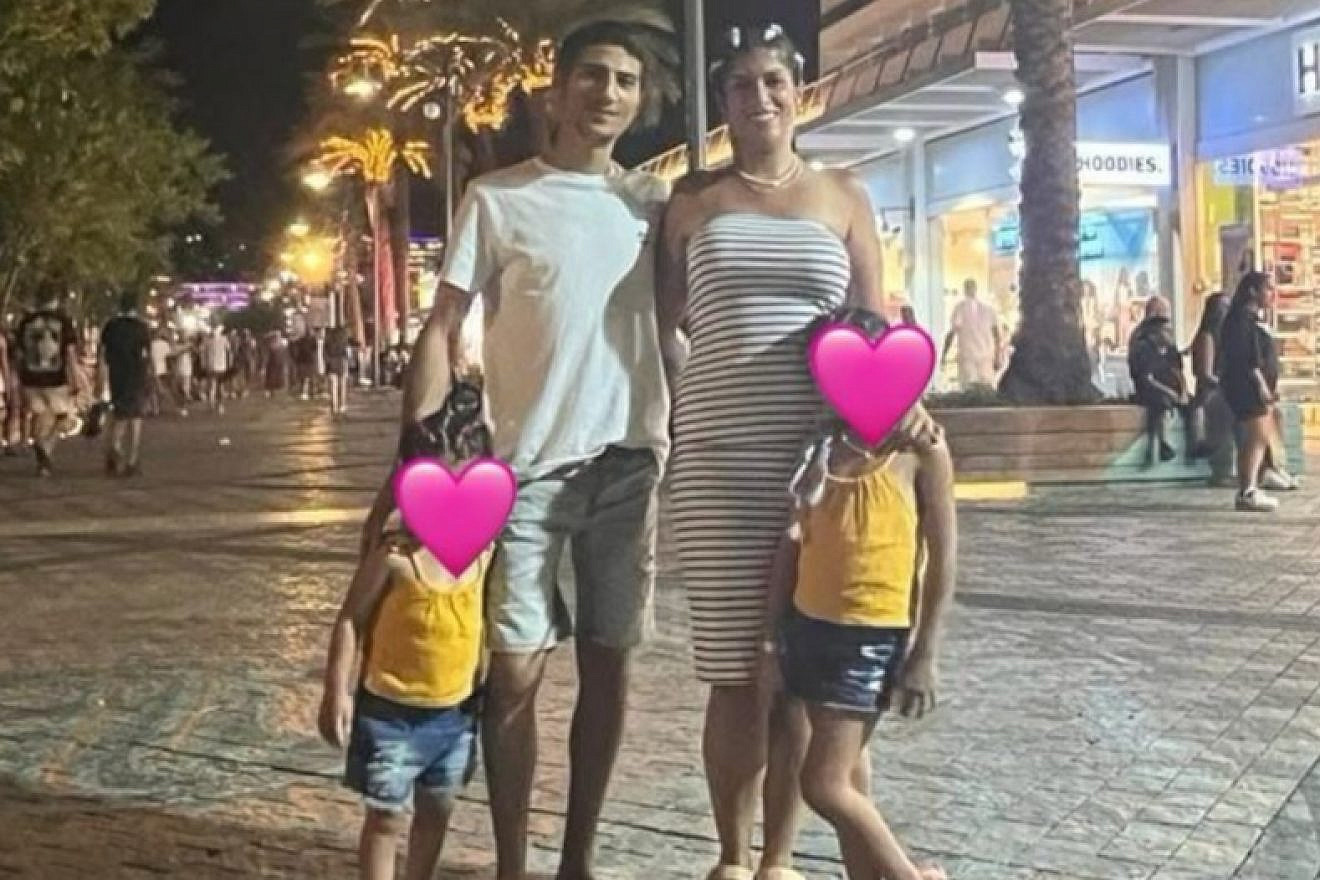“In a fleeting moment, our lives turned into misery,” said Ofir Swisa, the brother of Dolev Swisa, who was murdered along with his wife, Odaya, in front of their daughters, Romi, 7, and Lia, 3, on Oct. 7.

That morning, Dolev and Odaya heard rocket warning sirens in their Sderot home and immediately set off for central Israel. They put their daughters in their car and started driving, unaware that Hamas terrorists were converging on the city.
As their car was being ambushed, Dolev tried to escape with Lia but was shot while protecting her. Odaya was wounded but managed to gather the girls and cry out for help.
A Bedouin worker came to their rescue and started driving them to the local police station, which, unbeknownst to them, had been occupied by Hamas.
Terrorists shot Odaya three times at point blank range. The Bedouin rescuer was also murdered. The girls went unseen in the back seat of the car and were eventually saved by police officers while under fire.
A video of their rescue in which Romi, still inside the car with her mother lying dead, is heard asking the police, “Are you from Israel? Please take us from here, I am here with a baby, save us,” went viral on social media.
“My mother cries all day,” Ofir Swisa, who also lives in Sderot, told JNS. “My nieces are afraid of everything. They yell in their sleep. They scream and cry out for their mom and dad. They can’t hear approaching motorcycles without running away.”
While the state provides the girls with access to psychological treatment, Swisa said it’s never enough.
“Our life is now all about making sure that the girls have everything they need. We have to make sure they have clothes, a proper bat mitzvah, and give them the future they deserve. It’s hard,” he said.
On Sunday, ahead of Memorial Day, Swisa appeared in a briefing titled “Yom Hazikaron After October 7: Bereaved Siblings Special Panel” and organized by Media Central, a Jerusalem-based nonprofit media liaison service center for journalists, where he thanked the Bedouin man who sacrificed his life to save his nieces.
“Amer Abu Sabila, the Bedouin who tried to save my late sister-in-law Odaya and my two nieces, did an amazing thing. He had a pregnant wife and two children who will grow up without a father,” Swisa said in the briefing.
“The place was filled with terrorists so much so that the body of Odaya could not be taken away from there until 4 a.m. the following morning,” Swisa added, noting that it did not deter Abu Sabila from helping.

As Israel marks its first post-Oct. 7 Memorial Day on Monday, Swisa’s family is grieving.
“We always try to keep their memory alive,” he said. “Skazi [Asher Swissa, no relation, a well-known Israeli musician and record producer] is organizing an event in honor of my brother who was a music creator as well. On Yom Hazikaron [Memorial Day], we are planning to go to the cemetery and pay our respects.”
Since last Memorial Day (April 25, 2023), 1,599 Israeli soldiers and civilians have died. This includes 760 Israel Defense Forces soldiers (61 of whom succumbed to their wounds from previous years) and 834 civilians, of which 822 were killed on or after the Oct. 7 terrorist attacks by Hamas in southern Israel, according to numbers released by the Israeli Ministry of Defense on Thursday.
No body, no grave
Amir Alfasa is marking this Memorial Day without his aunt Maya Goren, who was taken hostage on Oct. 7 from Kibbutz Nir Oz. She was declared dead in captivity in December. Her body is still being held in the Strip.
“In the past month, we’ve tried to commemorate Maya in a lot of ways. One of her daughters had the idea of raising money in her name for Israeli families in need,” Alfasa told JNS.
“It’s hard to honor her in the way we do for other October 7 victims. Maya’s husband, Avner, who was also murdered on that day, is buried in Nir Oz. But Maya isn’t,” he explained. “It’s hard to grieve. It’s confusing to get to this day and not have a body to bury or a grave to go to.”
Maya’s family set up a memorial stone for her next to Avner’s grave, engraving with it a wish that she will eventually be properly interred there.
“We are still on this really difficult journey to bring her and all the others back, those who are still alive and those who aren’t. It’s been a very hard year, hard doesn’t even begin to describe it,” Alfasa said.
He said he is inspired by those who care enough to take to the streets and shout for their return, that it gives him hope.
“I know if she was there she’d be the first to join the fight to bring them home. That’s what she would want us to do. We are still there for her and for all the hostages. We want everyone to remember that they still haven’t returned,” said Alfasa.
“We want the deceased to be buried in dignity in Israel and not be thrown in a random place no one knows about in Gaza, near the terrorists that took their lives instead of here with us,” he added.
For Alfasa, honoring Maya and Avner’s lives means staying united as a family.
“My cousins lost both of their parents. We still see each other every day, and my parents have become theirs. I know that’s what Maya and Avner would have wanted us to do, keep being a strong family and be there for one another,” he said.


























